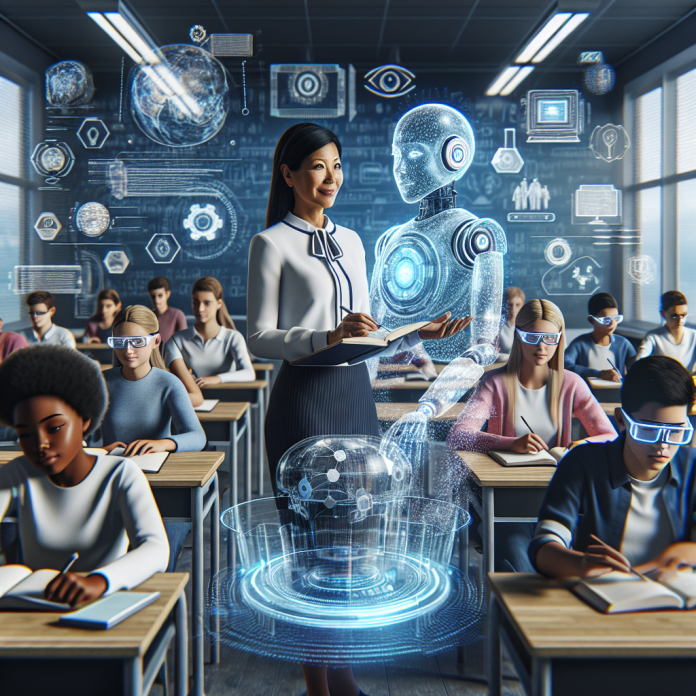AI or artificial intelligence has been revolutionizing various industries, and education is no exception. With the advancement of technology, AI has the potential to transform the way we educate students, making learning more personalized, efficient, and engaging. In this article, we will delve into the world of educating with AI, exploring its benefits, challenges, and real-life applications.
## Understanding AI in Education
AI in education refers to the use of artificial intelligence technologies such as machine learning, natural language processing, and deep learning to enhance the teaching and learning experience. By leveraging algorithms and data analytics, AI can provide personalized learning experiences, automate administrative tasks, and enable teachers to better cater to the needs of individual students.
One of the key advantages of AI in education is its ability to adapt to each student’s unique learning style and pace. Traditional one-size-fits-all educational approaches often leave students behind or fail to challenge them adequately. AI-powered systems can analyze students’ performance, preferences, and behaviors to create customized learning paths that optimize learning outcomes.
## Benefits of Educating with AI
### Personalized Learning
Imagine a classroom where each student has a personalized curriculum tailored to their strengths, weaknesses, and learning preferences. AI makes this vision a reality by processing vast amounts of data to identify patterns in students’ performance and behavior. With this information, AI can generate customized learning materials, provide targeted feedback, and adapt learning activities to suit each student’s needs.
### Enhanced Teaching Effectiveness
AI can also support teachers in their daily tasks, freeing up time for more meaningful interactions with students. Automated grading systems can evaluate student work instantly, allowing teachers to focus on providing feedback and support. Additionally, AI-powered assistants can help teachers plan lessons, identify at-risk students, and recommend interventions to improve student outcomes.
### Access to Quality Education
In many parts of the world, access to quality education is limited by factors such as geography, resources, and infrastructure. AI offers a solution by providing online learning platforms, virtual tutors, and interactive educational tools that can reach students in remote areas. By democratizing access to education, AI has the potential to bridge the digital divide and empower learners from diverse backgrounds.
## Real-Life Applications of AI in Education
### Adaptive Learning Platforms
Adaptive learning platforms such as Khan Academy and Coursera use AI algorithms to deliver personalized learning experiences to students. These platforms assess students’ knowledge, skills, and progress to recommend suitable learning materials, quizzes, and exercises. By adapting to each student’s needs, adaptive learning platforms enhance engagement, motivation, and retention.
### Virtual Reality Simulations
Virtual reality (VR) simulations powered by AI enable students to explore complex concepts in a hands-on, immersive environment. For example, medical students can practice surgical procedures in a virtual operating room, while history students can visit ancient civilizations through VR reconstructions. By integrating AI and VR technologies, educators can enhance student understanding and engagement in ways that traditional methods cannot.
### Intelligent Tutoring Systems
Intelligent tutoring systems like Carnegie Learning and Squirrel AI use AI to provide individualized tutoring and feedback to students. These systems analyze student responses, track progress, and adjust instruction in real-time to optimize learning outcomes. By simulating human tutors’ capabilities, intelligent tutoring systems supplement classroom instruction and support self-paced learning.
## Challenges of Educating with AI
While AI offers numerous benefits in education, it also presents challenges that must be addressed for successful implementation. One of the main concerns is the ethical use of AI, particularly in terms of data privacy, bias, and transparency. As AI systems rely on vast amounts of data to make decisions, there is a risk of violating students’ privacy rights and perpetuating existing inequalities.
Another challenge is the lack of infrastructure and digital literacy in schools, especially in underserved communities. Without access to reliable internet connections, devices, and technical support, educators and students may struggle to utilize AI technologies effectively. Addressing these disparities is essential to ensure equitable access to AI-powered educational tools and resources.
## The Future of Educating with AI
Despite its challenges, AI holds immense potential to revolutionize education and empower learners of all ages. As AI technologies continue to evolve, educators must adapt their practices to harness the benefits of AI while mitigating its risks. By embracing AI in education, we can create a future where every student receives personalized learning experiences, every teacher has access to support and resources, and every learner can reach their full potential.

